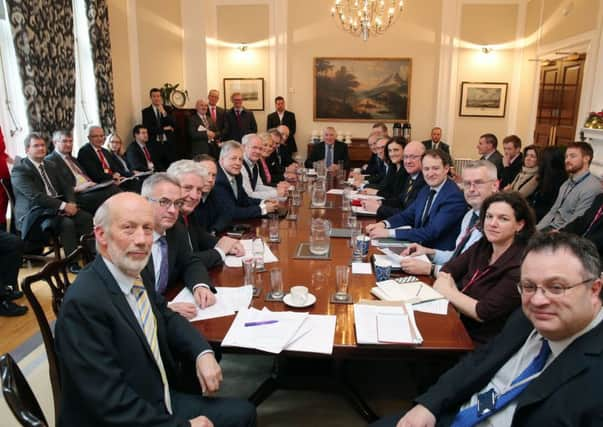Stephen Farry: It is wrong to say there is a legacy scandal, but even more so to say the Stormont House structures are unfair


And if implemented responsibly, the resultant process should assist in healing and reconciliation.
However, the News Letter is currently running the ‘Legacy Scandal’ series (see link below), with selective opinions running from heavy scepticism through to outright opposition of the Stormont House proposals, connected to a narrative in which the actions of terrorists are sanitised, and the actions of the state are subject to disproportionate scrutiny and placed on the same level.
Advertisement
Hide AdAdvertisement
Hide AdThis narrative is not the case today and is even less so regarding what would emerge from the Stormont House proposals.
But if a risk of such narrative emerging exists, it would be more likely in the context of the current flawed status quo, with the limited range of processes, which given their nature, examine issues relating to the state relatively more than the needs of the wider spectrum of victims.
Instead, the real danger of this narrative becoming commonplace comes from those highlighting it within propaganda efforts to discredit current or modified proposals to investigate and address the legacy.
As such, there is a danger of the myth developing it into a self-fulfilling prophecy.
Advertisement
Hide AdAdvertisement
Hide AdIf Stormont House is unpicked, the current system would continue indefinitely. Organisations, including the PSNI, are stretched to the limit and struggling with contested legal mandates. No alternative system will be negotiated.
From our engagement with different stakeholders, there is actually some consensus on how the detail of the consultation proposals could be improved. And it is important that all voices are heard and not drowned out.
Therefore, it would be a major tragedy if unfounded and exaggerated fears squeezed out proper consideration and refinement of viable proposals and left victims with the current flawed arrangements.
The effective choice is between the current flawed status quo and making the necessary improvements to Stormont House to make those proposals work and deliver.
Advertisement
Hide AdAdvertisement
Hide AdIn any society, but especially a divided and contested one, the past is always going to be debated, with contested narratives. Efforts to achieve a universally agreed consensus are inevitably doomed to failure, but this is not what Stormont House is seeking to accomplish, whether through the Oral History Archive or the Implementation and Reconciliation Group when it analyses patterns and themes.
That said, many people in Northern Ireland and further afield do share a number of starting points.
These include: there were injustices in Northern Ireland society; nothing justified the use of violence; those who engaged in violence had a choice and alternatives; not everyone shares equal responsibility for what happened; in sharp contrast to the actions of terrorists, the role of police, with the support of the army, was to uphold the rule of law and to keep the community safe; the vast majority of personnel acted bravely, with a sense of duty and made huge personal sacrifices; most deaths are due to the actions of republican and loyalist terrorists; issues with policy and practice of the state and its institutions and cases were individuals acted illegally do exist; and everyone, regardless of position, should be amenable to the law and held accountable for any illegality.
The criminal justice system today, as always, has a duty to act impartially, to follow the evidence and act in the public interest.
Advertisement
Hide AdAdvertisement
Hide AdThis includes holding the state actors accountable where appropriate. To do otherwise would undermine the rule of law. It is this that would create a narrative in which those charged with protecting the rule of law are exempt from it and relegated to the status of just one more side of what could then be described as a ‘war’.
The contribution of those who served on behalf of the community would be redefined and undermined.
We must be conscious of the large number of victims and survivors in our society that continue to bear physical and psychological wounds, experience mental trauma and have practical needs that remain not fully addressed.
There are considerable demands for truth, justice and accountability on a case by case basis.
Advertisement
Hide AdAdvertisement
Hide AdIt is the Stormont House arrangements that will more readily expand the range of interventions that can investigate deaths and support victims.
The scope for some improvements is clear.
Some key changes include extending the remit of the Historical Investigations Unit to encompass all cases that have been subject to review under the Historical Enquiries Team. Those who were injured within situations that involved death should have stronger rights. We need robust accountability mechanisms, and proportionality in approach to historical investigations.
Work needs to be undertaken to make the Oral History Archive a more active mechanism rather than a passive recipient.
This includes how to better encompass the experiences of those serving the community. And greater clarity is required at this stage as to how the IRG can actively promote and facilitate reconciliation.
Advertisement
Hide AdAdvertisement
Hide AdAlliance continues to be open to constructive engagement with all stakeholders.
• Stephen Farry MLA is the deputy leader of the Alliance Party
• For essays in our Legacy Scandal series click on this link and scroll down